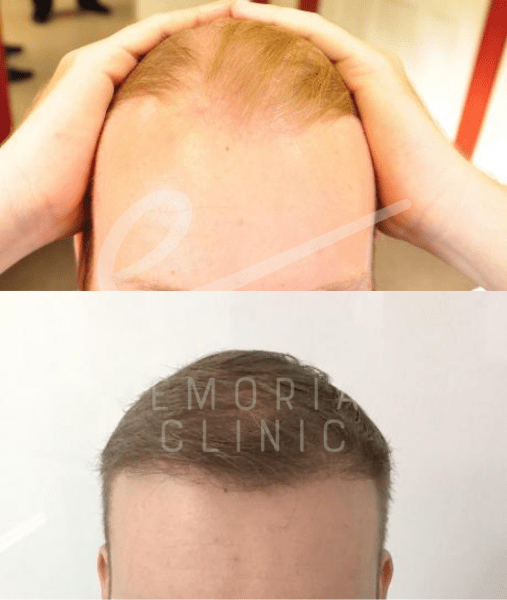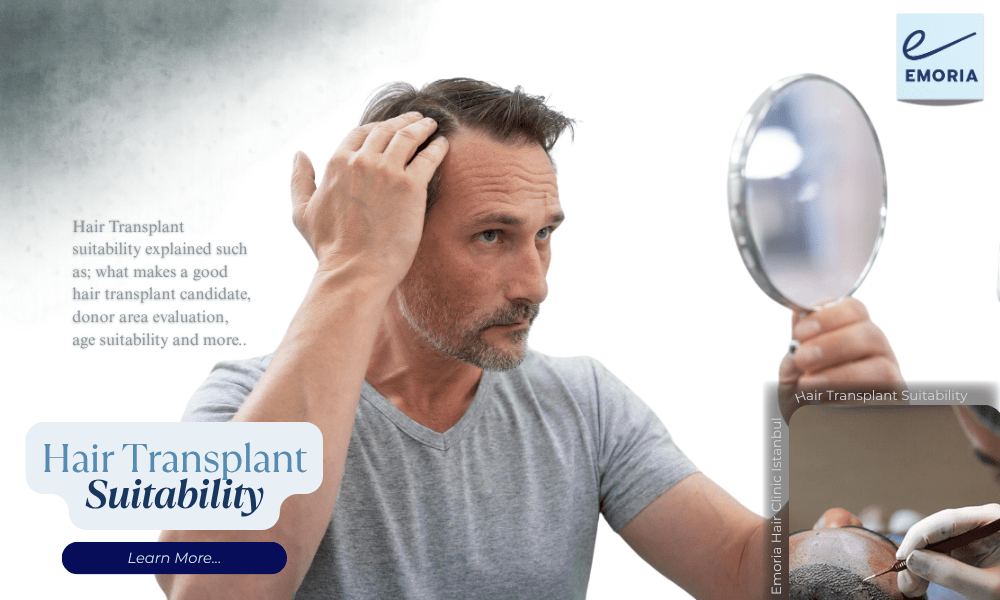There are common causes of hair loss which include stress, hormonal abnormalities, and iron deficiency. Although unusual, chronic hair loss could suggest a problem. Many different reasons might contribute to hair loss and baldness, but it doesn’t mean there is no cure.
New hair grows from one’s own hair follicles in areas of hair loss, with hair follicles on the back of the head typically being the most efficient donors. This procedure involves the incorporation of live hair follicles. This program, which has become popular in our country in recent years, helps you to produce a natural appearance. Working with a surgeon who specializes in the field can provide speedy results.
Hair loss can be uncomfortable, thus many people seek a hair transplant as a cure. However, not everyone is a good fit for this operation. There are key factors that influence hair transplant compatibility. After reading our blog, you can decide if this procedure is the correct action for you or not.
What Makes Someone a Good Candidate for a Hair Transplant?
You should have hair transplant candidacy to get the desired results. In general, there are three major variables that should be examined when assessing whether you are a good candidate for hair transplant. These include age, hair density, and overall health. Several critical factors influence hair transplant candidacy:
Donor Area Evaluation: Donor Density and Graft Availability
The first criteria for a hair transplant are the donor area evaluation. The quality and quantity of hair in the donor area are usually found on the back or sides of the head. And they have a significant impact on the success of a hair transplant. High donor area hair density guarantees an adequate number of grafts for transplantation. An ideal candidate is an example of a good candidate for hair transplant who has a donor area of at least 80 grafts per square centimeter. However, patients with fewer than 40 grafts per square centimeter may experience difficulties. In situations when scalp donor hair is limited, body hair can be used as an alternative source; nevertheless, this process may have limits.
Age Suitability for Hair Transplant
Age is the second important criteria to determine hair transplant candidacy. There are some age considerations for hair transplant. There is no age limit for hair transplant, but people aged 30 to 45 tend to have more consistent hair loss patterns. And this leads to better results. Younger candidates especially under 25 may experience ongoing hair loss. Therefore, it is preferable to wait until the pattern has stabilized before undergoing surgery.
Suitability Criteria for Female Patients
Women who are experiencing hair loss may want to consider Female Hair Transplant. Females, on the other hand, typically experience generalized thinning rather than male-specific hair loss. Hair transplant suitability in female candidates usually have localized bald patches or a well-defined donor area. To determine eligibility, an expertmust do a complete examination.
Hair loss can occur for a variety of reasons, including burns, trauma, and other causes. And they may be eligible for a hair transplant candidacy provided they are in excellent health. You should have a medical exam to ensure you’re eligible. Just because you do not currently meet the criteria for a hair transplant does not mean you will never be a good candidate for hair transplant.
Emoria Clinic provides virtual and in-person medical consultations; call us today to schedule a personal appointment!

Who Is Not a Candidate for a Hair Transplant?
Many people with early signs of hair loss benefit from hair transplant operations which increase density and attractiveness. The reality is that not everyone can expect to regenerate their entire head of hair with this method.
Hair transplants can be beneficial to many people. Yet, they are limited and cannot be generalized. Certain patients may not be good candidates for hair transplant examples due to physical, genetic, or lifestyle factors. This leads to poor results or an increased risk of issues. Potential patients considering having hair transplant candidacy criteria should carefully decide if it is appropriate for their unique condition and what is the best course of action for them. If they meet the standards for hair transplant suitability, they should go ahead with the treatment.
There are some health requirements for hair transplant. Thus, certain diseases may render individuals unsuitable for hair transplantation:
• Diffuse Unpatterned Alopecia, thinning without a consistent donor area can produce disappointing results.
• Cicatricial alopecias -particularly lichen planopilaris- can lower transplant survival.
• Alopecia Areata is an autoimmune disorder that causes unexpected hair loss which makes transplants less successful.
• Unstable hair loss needs medical intervention to stabilize the issue before surgery.
How Do Different Hair Characteristics Affect the Hair Transplant Procedure?
Hair type has a significant impact on hair transplant suitability and the results. From straight and smooth strands to exuberant curls, your hair texture is more than simply a personal characteristic. It has a big impact on how hair transplants are performed and the results you will receive.
Hair transplantation has advanced significantly, but it is not a generic solution treatment. Your hair’s structure, density, and curl pattern can all influence the transplant process, including hair graft placement and coverage.
When it comes to hair transplant methods, the texture and type of your hair can affect every part of the procedure.
Many people overlook it, but specialists are well aware that different hair types need distinct grafting and placing techniques.
Hair Transplants for Straight Hair
Straight hair is straight and elegant, resting flat against the head. While it is simple to style and maintain, it may be low in volume, causing significant issues during hair restoration.
Straight hair can make scars more obvious if not handled properly. In addition, inadequate angulation during implantation can make the results appear unnatural. Straight hair transplants on the other hand give exceptional results when performed by a trained surgeon: they are smooth, flawless, and seamlessly integrated.
Hair Transplant for Curly Hair
Curly hair in general is thick and abundant with a coiled or spiral structure. This natural texture masks uneven hair density, making it great for a major impact.
Extraction of curly hair transplants needs excellent dexterity. The follicles are twisted, making them difficult to take out intact. Mishandling increases the likelihood of graft degeneration. However, the benefits are substantial: curly hair’s density and structure provide the impression of fuller, thicker results.
Hair Transplant for Wavy Hair
Wavy hair combines the volume of curly hair with the smoothness and manageability of straight hair, creating the ideal balance.
One of the most difficult issues is ensuring that graft placement does not disrupt the natural wave pattern. A misaligned follicle might interrupt the passage of the waves, reducing the overall effect. When done correctly, wavy hair transplants produce naturally abundant and textured results.
Hair Transplants for Various Ethnic Hair Types
Recognizing the relationship between hair texture and ethnicity is critical. Afro-textured, Asian, and Caucasian hair each have distinct characteristics that demand diverse techniques.
Afro Hair Transplant
Afro hair requires special care due to its tight curls and density. FUE is widely preferred. However, the density produces some of the most natural results. It is crucial to get help from a clinic which is highly experienced in Afro Hair.
Asian Hair Transplant
Asian hair straight, coarse strands provide extraction issues but provide adequate scalp covering.
Caucasian hair varies the most in texture, making FUE or DHI possible depending on the individual.
Recognizing the relationship between hair texture and ethnicity is critical. Afro-textured, Asian, and Caucasian hair each have distinct characteristics that demand diverse techniques. FUE is perfect for curly and wavy hair since it leaves less scars and requires meticulous precision.
You should contact a well-known clinic like Emoria Clinic has previous experience with your particular hair type. Discuss your objectives and ask about their experience with hair textures similar to yours.
Hair Transplant Alternatives for Unsuitable Candidates
Those who are not ideal candidates for hair transplantation have numerous alternatives:
PRP Therapy
PRP Hair Treatment, Platelet-rich plasma injections, can promote hair growth by harnessing the patient’s natural growth factors.
Scalp Micropigmentation
It is a cosmetic tattooing technique that creates the illusion of fuller hair.
Medication
Minoxidil and Finasteride are treatments that can help with hair loss and regeneration.
Hair Systems or Wigs
High-quality hairpieces offer immediate visual enhancement without requiring surgical intervention.
Hair transplant suitability is determined by a thorough evaluation of numerous factors. These are donor area quality, age, hair quality, and overall health. Consultation with a skilled hair restoration specialist is required to determine candidacy. Then to explore the most appropriate treatment alternatives based on individual requirements.
References
Unger, W. P., & Shapiro, R. (2011). Hair Transplantation. CRC Press.
Trueb, R. M. (2010). “Hair Growth and Disorders.” Springer-Verlag Berlin Heidelberg.
Women with diffuse thinning may not be ideal candidates. However, if the donor area remains dense and the pattern is localized, a Female Hair Transplant may still be possible after evaluation.
Body hair can be used when donor area hair density on the scalp is low. It’s most effective when used with refined techniques like FUE Hair Transplant or DHI.
A good candidate for hair transplant should be in good health, also should not have any uncontrolled chronic conditions. Conditions such as diabetes and high blood pressure must be treated. People who are immunocompromised may require further clearance, although treatments such as HIV Positive Hair Transplant are now feasible with the proper team.

